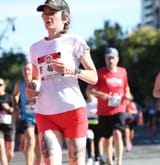The Supreme Court and Bad Health Tricks

It's been a very bad week for democracy — in many ways, in many places, in many directions, the most obvious and egregious of these being the Supreme Court’s decision in the aptly named Trump v United States. A bad week for democracy means a bad week for health and wellbeing, of course, and not just because many of us have spiraled with the thoughts of what fascists have in store for us.
The news was not so bad for tech investors, I guess, many of whom have explicitly aligned themselves with authoritarianism and are actively funding the dismantling of public institutions in the US and globally. I feel utterly helpless in the face of almost everything – so much so that the news has me considering a return to writing about ed-tech, if only because I'm used to screaming into the void there, pretty accustomed to my role of not being heard.
The US Track & Field Olympic Trials wrapped up on Sunday, after I'd written and scheduled Monday's newsletter detailing some of my favorite stories from the meet. So I'd be remiss if I didn't note my favorite moment, the one that – truth be told – has buoyed me all week long: Nikki Hiltz's epic win in the Women's 1500 meter race – a win that set a Trials record (breaking the one set in 2021 by this year's 3rd place finisher Ellie St. Pierre); a win that, on the last day of Pride Month, makes them the first transgender non-binary athlete to represent the US in the event. (I was looking for photos to embed here, and JFC, the comments on all the stories about them are fucking sickening.)
Also an Olympian: Quincy Wilson, who at age 16, will be the youngest male ever on the US Track Team. Wilson, who made the finals of the 400 meter race but came in sixth, was chosen for the 4x400 relay pool.
As you make your summer travel plans (for Paris or elsewhere) and/or plot your fastest escape routes from the country, Sam Robinson has some suggestions for the "Top 10 Strava Airport Segments."
Meanwhile, The Guardian continues its obsession with the Enhanced Games, "the Olympics where everyone dopes."
Fitness for the rest of us: "Sports are the new dating apps," according to The Cut. But not for enough of us, apparently as "nearly 1.8 billion adults at risk of disease from not doing enough physical activity," the World Health Organizatio cautions. (That's one-third of adults, with women and older people more likely to be inactive.) So get active, but "the right way" – or something. TikTok is full of "bad health 'tricks'," cautions Vox (perhaps this explains why half the people in the gym are walking backwards on an incline on the treadmill). According to a survey by YouGov.com, people cancel their gym memberships because they cost too much (not because, as perhaps TikTok would make you think, they aren't getting "the results" they want.)
The business of health and fitness: Foodsmart has raised $200 million for a "telenutrition approach to healthy eating." (This does remind me of the news from LAUSD about the failure of its AI chatbot – something I'll write more about in Monday's "The Extra Mile" newsletter: what makes technologists think that, when it comes to health, wellness, education, that we want to interact with robots, via screens? These are institutions that – supposedly – require great care and humanity, not automated one-line messaging.) The NFL was ordered to pay $4.7 billion in an antitrust case, after a jury unanimously agreed that it had colluded to drive up pricing for its "Sunday Ticket" package. Cadence has raised $100 million for what it says is "the first-ever ready-to-drink mineral salt-based hydration beverage." Vanity Fair on counterfeit Ozempic. I am not surprised to learn that a startup is going to offer a GLP-1 focused corporate wellness program.
Updates on our fitness technology infrastructure: Curbed on "The Citi Bike Battery Crew Racing to Charge 15,000 E-Bikes." Meanwhile, Lyft just announced its raising the price of Citi Bike e-bikes for the second time this year. The Wall Street Journal says that "Apple Watch Is Becoming Doctors' Favorite Medical Device." Suuuure. I mean, the fitness technology industry in general is out here resolving all the real health issues with, for example, sunglasses that change tint depending on your "environment, activity, mood and style."
Thanks for subscribing to Second Breakfast. Want to hear my thoughts about intelligent tutors, AI chatbots, and education? Become a paid subscriber and you'll receive a newsletter on Mondays, where I flesh out some ideas about technologies, minds, and bodies.





